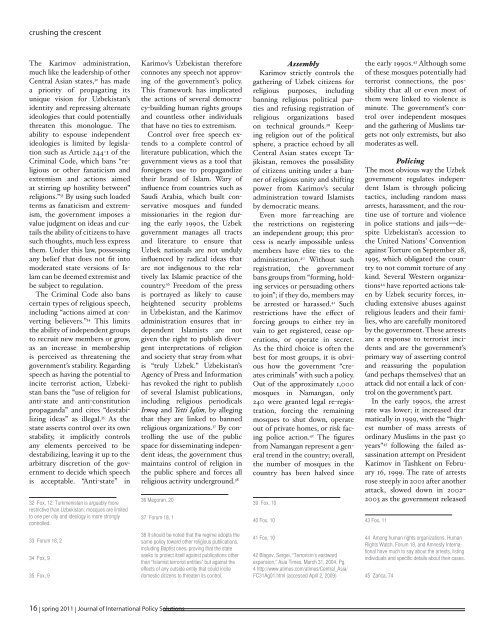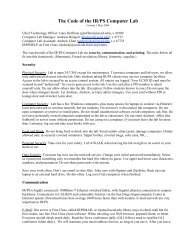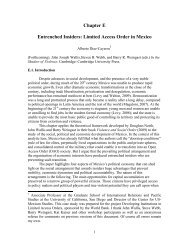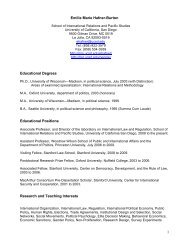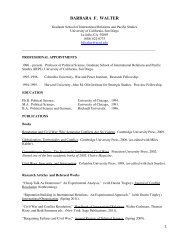to download the full journal. (1.2MB PDF) - School of International ...
to download the full journal. (1.2MB PDF) - School of International ...
to download the full journal. (1.2MB PDF) - School of International ...
You also want an ePaper? Increase the reach of your titles
YUMPU automatically turns print PDFs into web optimized ePapers that Google loves.
crushing <strong>the</strong> crescent<br />
The Karimov administration,<br />
much like <strong>the</strong> leadership <strong>of</strong> o<strong>the</strong>r<br />
Central Asian states, 32 has made<br />
a priority <strong>of</strong> propagating its<br />
unique vision for Uzbekistan’s<br />
identity and repressing alternate<br />
ideologies that could potentially<br />
threaten this monologue. The<br />
ability <strong>to</strong> espouse independent<br />
ideologies is limited by legislation<br />
such as Article 244-1 <strong>of</strong> <strong>the</strong><br />
Criminal Code, which bans “religious<br />
or o<strong>the</strong>r fanaticism and<br />
extremism and actions aimed<br />
at stirring up hostility between”<br />
religions.” 33 By using such loaded<br />
terms as fanaticism and extremism,<br />
<strong>the</strong> government imposes a<br />
value judgment on ideas and curtails<br />
<strong>the</strong> ability <strong>of</strong> citizens <strong>to</strong> have<br />
such thoughts, much less express<br />
<strong>the</strong>m. Under this law, possessing<br />
any belief that does not fit in<strong>to</strong><br />
moderated state versions <strong>of</strong> Islam<br />
can be deemed extremist and<br />
be subject <strong>to</strong> regulation.<br />
The Criminal Code also bans<br />
certain types <strong>of</strong> religious speech,<br />
including “actions aimed at converting<br />
believers.” 34 This limits<br />
<strong>the</strong> ability <strong>of</strong> independent groups<br />
<strong>to</strong> recruit new members or grow,<br />
as an increase in membership<br />
is perceived as threatening <strong>the</strong><br />
government’s stability. Regarding<br />
speech as having <strong>the</strong> potential <strong>to</strong><br />
incite terrorist action, Uzbekistan<br />
bans <strong>the</strong> “use <strong>of</strong> religion for<br />
anti-state and anti-constitution<br />
propaganda” and cites “destabilizing<br />
ideas” as illegal. 35 As <strong>the</strong><br />
state asserts control over its own<br />
stability, it implicitly controls<br />
any elements perceived <strong>to</strong> be<br />
destabilizing, leaving it up <strong>to</strong> <strong>the</strong><br />
arbitrary discretion <strong>of</strong> <strong>the</strong> government<br />
<strong>to</strong> decide which speech<br />
is acceptable. “Anti-state” in<br />
32 Fox, 12. Turkmenistan is arguably more<br />
restrictive than Uzbekistan; mosques are limited<br />
<strong>to</strong> one per city and ideology is more strongly<br />
controlled.<br />
Karimov’s Uzbekistan <strong>the</strong>refore<br />
connotes any speech not approving<br />
<strong>of</strong> <strong>the</strong> government’s policy.<br />
This framework has implicated<br />
<strong>the</strong> actions <strong>of</strong> several democracy-building<br />
human rights groups<br />
and countless o<strong>the</strong>r individuals<br />
that have no ties <strong>to</strong> extremism.<br />
Control over free speech extends<br />
<strong>to</strong> a complete control <strong>of</strong><br />
literature publication, which <strong>the</strong><br />
government views as a <strong>to</strong>ol that<br />
foreigners use <strong>to</strong> propagandize<br />
<strong>the</strong>ir brand <strong>of</strong> Islam. Wary <strong>of</strong><br />
influence from countries such as<br />
Saudi Arabia, which built conservative<br />
mosques and funded<br />
missionaries in <strong>the</strong> region during<br />
<strong>the</strong> early 1990s, <strong>the</strong> Uzbek<br />
government manages all tracts<br />
and literature <strong>to</strong> ensure that<br />
Uzbek nationals are not unduly<br />
influenced by radical ideas that<br />
are not indigenous <strong>to</strong> <strong>the</strong> relatively<br />
lax Islamic practice <strong>of</strong> <strong>the</strong><br />
country. 36 Freedom <strong>of</strong> <strong>the</strong> press<br />
is portrayed as likely <strong>to</strong> cause<br />
heightened security problems<br />
in Uzbekistan, and <strong>the</strong> Karimov<br />
administration ensures that independent<br />
Islamists are not<br />
given <strong>the</strong> right <strong>to</strong> publish divergent<br />
interpretations <strong>of</strong> religion<br />
and society that stray from what<br />
is “truly Uzbek.” Uzbekistan’s<br />
Agency <strong>of</strong> Press and Information<br />
has revoked <strong>the</strong> right <strong>to</strong> publish<br />
<strong>of</strong> several Islamist publications,<br />
including religious periodicals<br />
Irmoq and Yetti Iqlim, by alleging<br />
that <strong>the</strong>y are linked <strong>to</strong> banned<br />
religious organizations. 37 By controlling<br />
<strong>the</strong> use <strong>of</strong> <strong>the</strong> public<br />
space for disseminating independent<br />
ideas, <strong>the</strong> government thus<br />
maintains control <strong>of</strong> religion in<br />
<strong>the</strong> public sphere and forces all<br />
religious activity underground. 38<br />
36 Megoran, 20<br />
37 Forum 18, 1<br />
Assembly<br />
Karimov strictly controls <strong>the</strong><br />
ga<strong>the</strong>ring <strong>of</strong> Uzbek citizens for<br />
religious purposes, including<br />
banning religious political parties<br />
and refusing registration <strong>of</strong><br />
religious organizations based<br />
on technical grounds. 39 Keeping<br />
religion out <strong>of</strong> <strong>the</strong> political<br />
sphere, a practice echoed by all<br />
Central Asian states except Tajikistan,<br />
removes <strong>the</strong> possibility<br />
<strong>of</strong> citizens uniting under a banner<br />
<strong>of</strong> religious unity and shifting<br />
power from Karimov’s secular<br />
administration <strong>to</strong>ward Islamists<br />
by democratic means.<br />
Even more far-reaching are<br />
<strong>the</strong> restrictions on registering<br />
an independent group; this process<br />
is nearly impossible unless<br />
members have elite ties <strong>to</strong> <strong>the</strong><br />
administration. 40 Without such<br />
registration, <strong>the</strong> government<br />
bans groups from “forming, holding<br />
services or persuading o<strong>the</strong>rs<br />
<strong>to</strong> join”; if <strong>the</strong>y do, members may<br />
be arrested or harassed. 41 Such<br />
restrictions have <strong>the</strong> effect <strong>of</strong><br />
forcing groups <strong>to</strong> ei<strong>the</strong>r try in<br />
vain <strong>to</strong> get registered, cease operations,<br />
or operate in secret.<br />
As <strong>the</strong> third choice is <strong>of</strong>ten <strong>the</strong><br />
best for most groups, it is obvious<br />
how <strong>the</strong> government “creates<br />
criminals” with such a policy.<br />
Out <strong>of</strong> <strong>the</strong> approximately 1,000<br />
mosques in Namangan, only<br />
240 were granted legal re-registration,<br />
forcing <strong>the</strong> remaining<br />
mosques <strong>to</strong> shut down, operate<br />
out <strong>of</strong> private homes, or risk facing<br />
police action. 42 The figures<br />
from Namangan represent a general<br />
trend in <strong>the</strong> country; overall,<br />
<strong>the</strong> number <strong>of</strong> mosques in <strong>the</strong><br />
country has been halved since<br />
39 Fox, 10<br />
40 Fox, 10<br />
<strong>the</strong> early 1990s. 43 Although some<br />
<strong>of</strong> <strong>the</strong>se mosques potentially had<br />
terrorist connections, <strong>the</strong> possibility<br />
that all or even most <strong>of</strong><br />
<strong>the</strong>m were linked <strong>to</strong> violence is<br />
minute. The government’s control<br />
over independent mosques<br />
and <strong>the</strong> ga<strong>the</strong>ring <strong>of</strong> Muslims targets<br />
not only extremists, but also<br />
moderates as well.<br />
Policing<br />
The most obvious way <strong>the</strong> Uzbek<br />
government regulates independent<br />
Islam is through policing<br />
tactics, including random mass<br />
arrests, harassment, and <strong>the</strong> routine<br />
use <strong>of</strong> <strong>to</strong>rture and violence<br />
in police stations and jails—despite<br />
Uzbekistan’s accession <strong>to</strong><br />
<strong>the</strong> United Nations’ Convention<br />
against Torture on September 28,<br />
1995, which obligated <strong>the</strong> country<br />
<strong>to</strong> not commit <strong>to</strong>rture <strong>of</strong> any<br />
kind. Several Western organizations<br />
44 have reported actions taken<br />
by Uzbek security forces, including<br />
extensive abuses against<br />
religious leaders and <strong>the</strong>ir families,<br />
who are care<strong>full</strong>y moni<strong>to</strong>red<br />
by <strong>the</strong> government. These arrests<br />
are a response <strong>to</strong> terrorist incidents<br />
and are <strong>the</strong> government’s<br />
primary way <strong>of</strong> asserting control<br />
and reassuring <strong>the</strong> population<br />
(and perhaps <strong>the</strong>mselves) that an<br />
attack did not entail a lack <strong>of</strong> control<br />
on <strong>the</strong> government’s part.<br />
In <strong>the</strong> early 1990s, <strong>the</strong> arrest<br />
rate was lower; it increased dramatically<br />
in 1999, with <strong>the</strong> “highest<br />
number <strong>of</strong> mass arrests <strong>of</strong><br />
ordinary Muslims in <strong>the</strong> past 50<br />
years” 45 following <strong>the</strong> failed assassination<br />
attempt on President<br />
Karimov in Tashkent on February<br />
16, 1999. The rate <strong>of</strong> arrests<br />
rose steeply in 2001 after ano<strong>the</strong>r<br />
attack, slowed down in 2002–<br />
2003 as <strong>the</strong> government released<br />
43 Fox, 11<br />
33 Forum 18, 2<br />
34 Fox, 9<br />
35 Fox, 9<br />
38 It should be noted that <strong>the</strong> regime adopts <strong>the</strong><br />
same policy <strong>to</strong>ward o<strong>the</strong>r religious publications,<br />
including Baptist ones, proving that <strong>the</strong> state<br />
seeks <strong>to</strong> protect itself against publications o<strong>the</strong>r<br />
than “Islamist terrorist entities” but against <strong>the</strong><br />
effects <strong>of</strong> any outside entity that could incite<br />
domestic citizens <strong>to</strong> threaten its control.<br />
41 Fox, 10<br />
42 Blagov, Sergei, “Terrorism’s eastward<br />
expansion,” Asia Times, March 31, 2004. Pg.<br />
4 http://www.atimes.com/atimes/Central_Asia/<br />
FC31Ag01.html (accessed April 2, 2009)<br />
44 Among human rights organizations, Human<br />
Rights Watch, Forum 18, and Amnesty <strong>International</strong><br />
have much <strong>to</strong> say about <strong>the</strong> arrests, listing<br />
individuals and specific details about <strong>the</strong>ir cases.<br />
45 Zanca, 74<br />
16 | spring 2011 | Journal <strong>of</strong> <strong>International</strong> Policy Solutions


